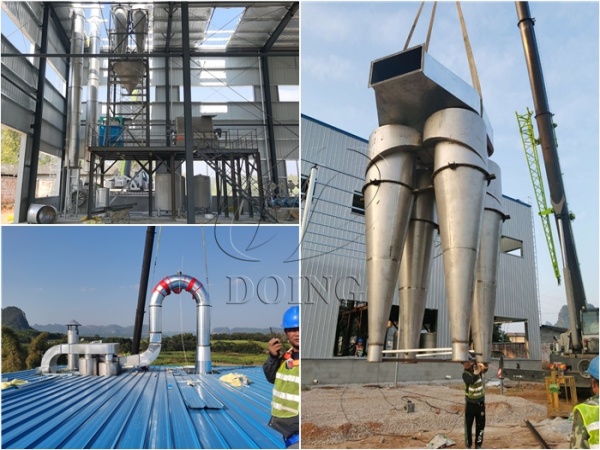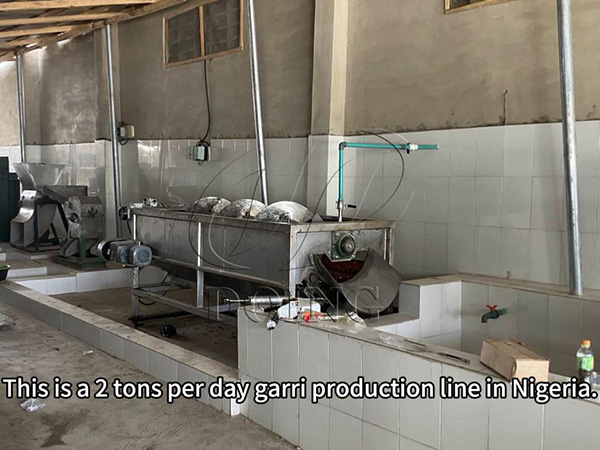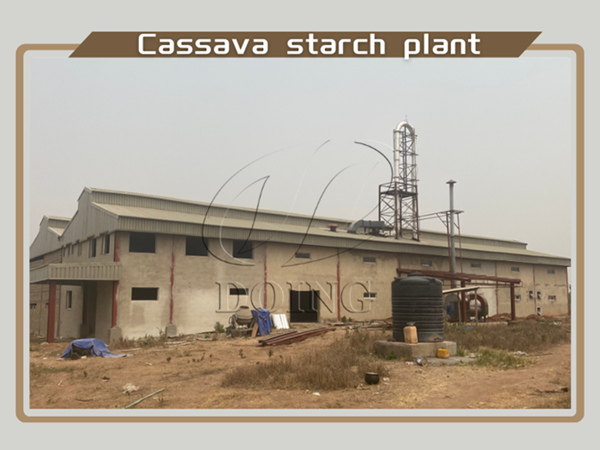
The current market of garri in Nigeria
FAQ/ Chat online/ Leave a message/ July 5, 2019
One major achievement of the present civilian administration in Nigeria in the past eleven (11) years has been the growth of middle class which has been witnessed in the country. These growths continues to drive the increasing social and health awareness of the need for hygienically well prepared foods required for good quality living standard of people. This coupled with the geometrically exploding population and continued rural-urban drift continues to fuel the demand for food stuffs especially Garri, a staple food in the country.
Garri, a product gotten from the processing of cassava tubers is a very important staple food item in Nigeria. It is one of the food items that defy socio-economic class, religious and ethnic boundaries, It is doubtful if it is not eaten daily in one of every two homes in the country.
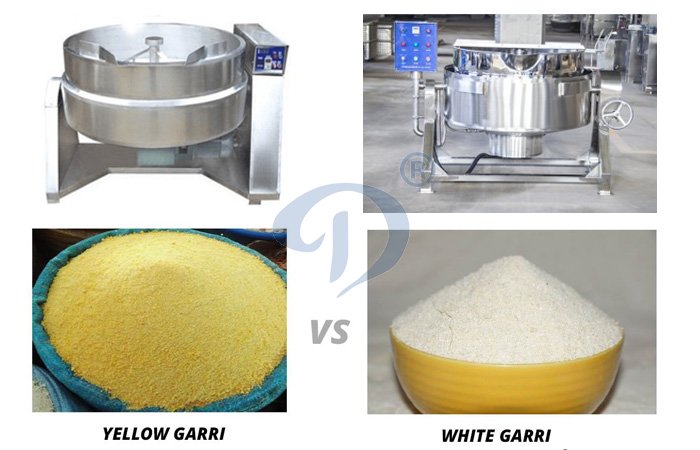
Garri & garri fryer
Garri is a creamy-white, granular flour with a slightly fermented flavour and a slightly sour taste made from fermented, gelatinized fresh cassava tubers. Garri is widely known in Nigeria and other West African countries. Garri constitutes a daily meal to millions people world-wide.
It is a popular West African food. It is most widely eaten as Eba. Eba is made by sprinkling garri into a bowl or pot of boiling water and stirred until dough of garri is formed. You could add more water to the dough and stir to your desired texture. The finished product is called eba.
Eba is served with vegetable soup and fish or meat. In combination, this constitutes a very balanced diet.
There are different types of garri, depending on how it is processed, its grain size and the region of Africa where it is produced.
The Standards Organization of Nigeria classifies garri into:
Extra fine grain garri – where more than 80% of the grain passes through a sieve of less than 350 micro meter aperture
Fine grain garri – More than 80 % of the grains pass through a sieve of less than 1000 micro meter aperture
Coarse grain garri – Not less than 80% of grains passes through a sieve of 1400 micro meter or less than 20 % of weight passes through a sieve of 1000 micro meter
Extra coarse grain garri – Not less than 20 % of grain is retained on a sieve of 1400 micro meter aperture.
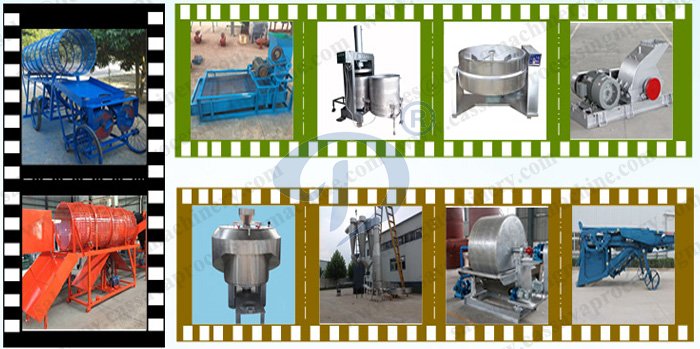
Cassava processing machine
Garri can also be classified based on fermentation length (days and extent) as well as whether palm oil is added to make it yellow or not. Such classifications include:
Yellow Garri
This is the type of garri commonly found in the Edo, Delta and other eastern part of Nigeria. It is also called Bendel garri. It is made exactly the way described above, but for the addition of red palm oil after grating the cassava and the garri is allowed to ferment for two to three days also. Adding palm oil to the garri further helps to reduce the cyanide content and gives it a unique flavor.
White Garri
Same as Bendel garri, left to ferment for two to three days as well, but red palm oil is not added during processing.
Ijebu Garri
Ijebu garri is made same way too, but allowed to ferment for up to seven days. No palm oil is added. It is also fried to become much crisped. It characteristically has a very sharp taste and less starchy. Many people from the Western part of Nigeria love this and find it great for “soaking”.
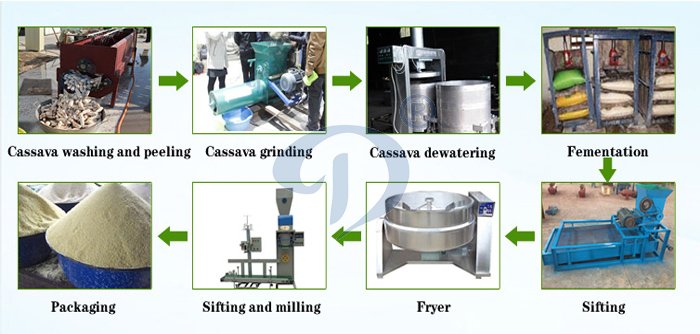
Complete garri processing line
The garri industry in Nigeria is dominated by small scale with production capacity of less than 0.1 tons per day. The production plants are usually found all parts of Nigeria where the chief raw material, Cassava tubers, can be found.
Nigeria is the leading producer of cassava tubers in the world with an annual production of about 40,000,000 tonnes and at such sourcing for the raw materials would not be a challenge.
Garri,a product gotten from the processing of cassava tubers is a very important staple food item in Nigeria. It is one of the food items that defy socio-economic class, religious and ethnic boundaries, It is doubtful if it is not eaten daily in one of every two homes in the country.
The annual national demand for garri is estimated at 1,000,000 tonnes while the national supply estimate is about 250,000.
In recent times due to the other products (Cassava Starch and Flour) that can gotten from cassava tubers ,the production of garri in Nigeria has witnessed a reduction in volume thereby prompting a shift in the demand-supply equilibrium in favour of garri producers.
The supply gap has been identified to continue to expand as the population of the country which is estimated to be 165 Million continues to grow at 3.5% per annum. Also the rural urban drift in the country would help to deepen the market for garri which is estimated at over N 8 billion annually in Nigeria.
Leave A Message
- Do you want to buy machine?
- Yes, I want to buy machine
- No, I want to learn more in advance.
- What is your raw material?
- Cassava
- Potato
- Sweet potato
- Others
- 2. What is the final product you want to produce?
- Garri
- Cassava flour
- Cassava starch
- Cassava chips
- Attiekie
- Bammy
- Others
- 3.What is your capacity plan?
- Small scale garri machine
- 1ton per day
- 2tons per day
- 3tons per day
- 10tons per day
- 20tons per day
- Others
- 3.What is your capacity plan?
- Small scale
- 5tons per day
- 10tons per day
- 20tons per day
- 50tons per day
- 100tons per day
- Others
- 3.What is your capacity plan?
- Small scale
- 5tons per day
- 10tons per day
- 20tons per day
- 50tons per day
- 100tons per day
- 200tons per day
- 300tons per day
- Others
- 3.What is your capacity plan?
- Small scale
- Middle type
- Large scale
- What is your capacity plan?
- Small scale
- 5tons per day
- 10tons per day
- 20tons per day
- 50tons per day
- 100tons per day
- 200tons per day
- 300tons per day
- Others

